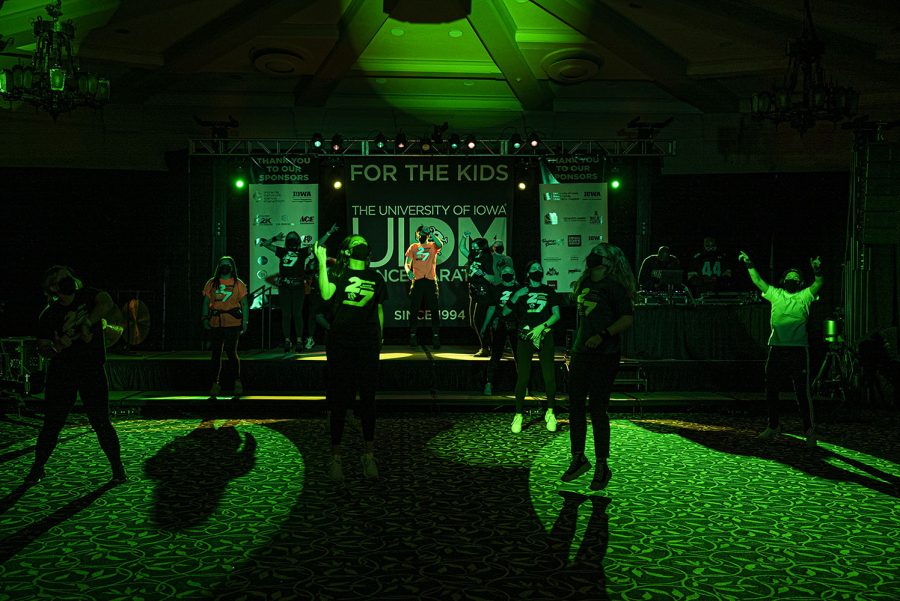Opinion | Don’t stop fighting For The Kids
It is important to continue supporting children with cancer despite the biggest weekend of University of Iowa’s largest fundraiser for pediatric cancer — Dance Marathon — wrapping up.
Dance marathon Morale Captains dance alone in the Iowa Memorial Union on Saturday, February 27th, 2021. Due to the pandemic, the annual charity event which normally packs the entire building, has been converted to a digital live stream leaving the Iowa Memorial Union nearly empty.
March 11, 2021
During the pandemic, the sweetest tradition at the University of Iowa dances on.
Dance Marathon 27 raised $1.4 million at their virtual Big Event. The Big Event may be over, but we must continue supporting the kids.
Possible ways to help children with cancer include donating to hospitals, starting a fundraiser, or even sharing a story about a pediatric cancer patient on social media. This year’s Dance Marathon members did a myriad of creative activities for fundraising — including selling crafts, having fundraisers at hometown pizza places, collecting pop cans, and asking friends for donations.
These are all things which can still be done, even if Dance Marathon 27 is over. The Big Event wrapping up doesn’t change that there are still thousands of children with cancer, and we need to continue supporting them year-round. One of the ways we can do that is by donating to funding that researches cures.
The American Cancer Society predicts about 10,500 children under the age of 15 will be diagnosed with cancer in the U.S. in 2021, and the rates of childhood cancer have slightly been increasing over the decades. Pediatric cancer is the leading cause of death by disease among children in America. Forty-five children from infants to 19-year-olds undergo cancer treatment every year.
Treatments for pediatric cancer include chemotherapy, immunotherapy, and surgery. Surgery includes removing the cancerous tumor and surrounding tissue. Chemotherapy is using drugs to remove cancer cells. Immunotherapy is using materials made by the body or in a laboratory to improve, target, or restore immune system function.
Children and their families should have adequate financial support when going through treatment, and we should all take part in providing that. Funding research will also help find ways to find treatments that will prevent death. Even one death because of cancer is heartbreaking — especially when it is a child. However, supporting children with cancer doesn’t have to be just financially.
While most pediatric cancer patients seem to handle their situation psychologically well, many report symptoms of post-traumatic stress disorder, anxiety, and depression. Research suggests PTSD symptoms affect 75 percent of pediatric cancer patients, and some specific ones occur more often in children with cancer. These include nightmares, flashbacks, feeling helpless, and being easily startled. They also include a desire to avoid people, places, or things associated with the experience.
Sometimes, the biggest contribution we can make to them is not financial at all. During a meeting for a student organization I am on the executive board of, we made virtual Valentine’s Day cards for children at St. Jude’s Hospital. The idea filled my heart with so much warmth, I passed along the idea to other Daily Iowan staffers and another student organization I am on the executive board of.
Supporting pediatric cancer patients helps them by reminding them despite the hard situation they are in, someone still cares about them. Childhood cancer is not eradicated just because the Big Event is over. We must continue helping some of the bravest kids in the world.
Columns reflect the opinions of the authors and are not necessarily those of the Editorial Board, The Daily Iowan, or other organizations in which the author may be involved.



